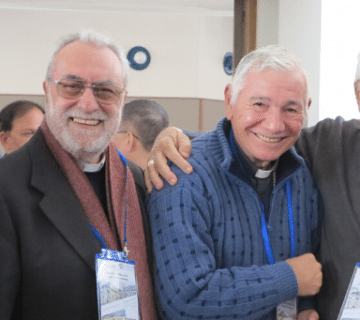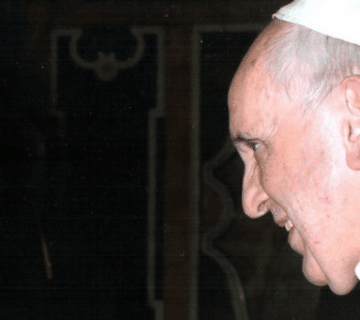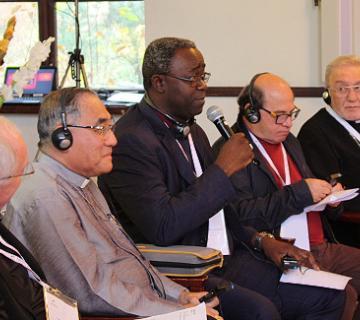 From all over the world
From all over the world
Ongoing protests and rebellion in Haiti, ethnic conflicts in Burundi and Congo, devastating floods in northeastern Brazil, the tense situation of Christian minorities in the Islamic states from North Africa to Kazakhstan: these are some of the contexts from which the 105 Bishops, friends of the Focolare Movement came, invited by Card. Miloslav Vlk, to attend their 28th international meeting, held February 14 to 20, at the Mariapolis Center of Castelgandolfo (Rome).
 The bishops gathered around the Pope
The bishops gathered around the Pope
The culminating point of their meeting was the participation in the General Audience on Wednesday, February 18. To the onlooker, the occasion offered a singular picture of the Pope with the Bishops seated around him just a few steps away, almost like an icon of effective and affective collegiality. In the message he sent them, Pope John Paul II expressed his heartfelt appreciation for the theme of the meeting. After extending special greetings to Chiara Lubich who was also present, he stated that, “Only a Christian community that shines out for its sanctity is capable of effectively carrying out the mission entrusted to it by Christ – that is, to spread the Gospel to the farthest ends of the earth.” The Holy Father further underscored the need for the baptized to learn “how to live the Gospel coherently in daily life … It is precisely in the ordinary that we have to live out the extraordinary.”
Brotherhood put into practice
The bishops’ desire to create a strong spirit of brotherhood in which they could share their sufferings, joys, cares and challenges inspired them to gather from all over the world. “I arrived here burdened by suffering, but your presence, care and love have relieved me,” confided a bishop from a country torn by civil war. His North African confrere remarked: “This is a time of grace, precisely because we meet, get to know each other, and live as one body.”
Starting again with the Gospel
Brotherhood was not the only mark of the meeting but spirituality as well, as the theme itself, “All God’s people are called to holiness: living and re-proposing the high standard of ordinary christian living”, indicated. Far from being a theoretical appeal, it is not only possible but extremely up-to-date, as proven by the experiences of life shared by the Bishops, families, youth, priests, committed parishioners and social workers. Starting off from the Gospel and the Gospel-derived “art of loving,” families are formed into vanguards capable of carrying out the new evangelization through their lifestyle which is strikingly “against the current”. Christian communities acquire a new fascination able to attract even those who are unfamiliar with the Church.
 Our neighbor, privileged way to union with God
Our neighbor, privileged way to union with God
Chiara Lubich shared her experience on “Union with God” at the Meeting, with particular emphasis on “our neighbor as the way to union”. “For us,” she said, “the typical, undisputed, indispensable, and successfully proven way is this one: we achieve union with God by loving our neighbor.” She recalled the concise trinomial which Igino Giordani, co-founder of the Movement, used to describe this way: “I, my neighbor, God”. “If we take this road,” the Focolare foundress explained, “God manifests himself within us. We feel his presence. We are no longer by ourselves, but two: he and us.” And this is true, whatever situation we find ourselves in, she added. “We must all become mystics if we want to live out Christianity in today’s world,” commented a bishop from Hungary, citing the theologian Karl Rahner who said that “The Christians of the future either they are mystics, or they are not Christians.”
Words from Cardinals Kasper and Re
The constant point of reference for reflection both during the plenary session and group meetings was the post-Synodal Exhortation of Pope John Paul II, Pastores gregis, particularly the second part which is dedicated to the bishop’s spiritual life. Card. Walter Kasper referred to it to when he addressed the bishops during the concelebrated Mass where he presided, describing the bishop as a man of the beatitudes.
Also Card. Giovanni Battista Re, Prefect of the Congregation for Bishops, presided over one of the concelebrations. He expressed his joy for this Convention, which offered a favorable occasion “not only to deepen one’s relationship with Christ but also to build brotherhood among bishops,” – a very important aspect in these extremely difficult times, he noted.
Spirituality of communion: its influence in the social field
The catalyst of this experience is the spirituality of communion, which is being developed in the Focolare Movement and is bearing fruit not only in the ecclesial sphere but also in the sphere of dialogue among different cultures and religions. “Here we are not only dealing with a purely spiritual experience but of a driving force with a universal impact, even in economics, politics, and social development,” observed a bishop from Switzerland after seeing the videos which effectively relayed the Movement’s 60 years of life since its birth in 1943. The bishops were able to go through each of the 6 decades of the Focolare’s history, very rich with hope especially because – as the bishops themselves commented – it testifies to the fact that right in these times when icy winds are smothering the light of faith, God is intensely at work to prepare a new flowering of evangelical life.
Apostles of dialogue
The Meeting – which brought to light the strong convergence existing between the current directives of the Church and the effects brought about by the charism of unity – concluded with a conversation between the Bishops and Chiara Lubich. The session was a deepening on the novel expression with which Pope John Paul II described the people of the Focolare in the message he sent on the occasion of the Movement’s 60th anniversary: “apostles of dialogue” in the heart of the Church, among the different Christian denominations, with followers of other religions, and with people who do not profess any specific religious belief. And apostles of dialogue is what they want to be, the bishops said, as they departed for their respective nations.


 Italiano
Italiano Español
Español Français
Français Português
Português


